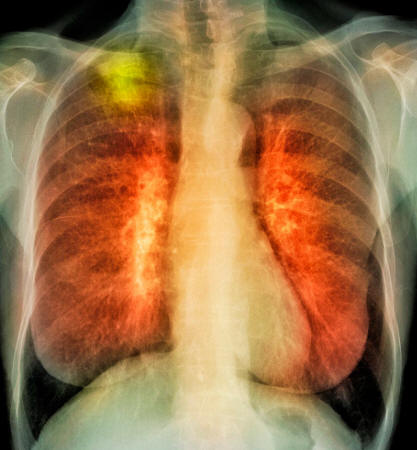|
and
America Wants It
from
Wired Website Lung cancer. Colored X-ray of the chest of an 84 year old woman with a malignant (cancerous) tumour (yellow) in the apex of the right lung (top left).
Cuba has for several years had a promising therapeutic vaccine against lung cancer. The 55-year trade embargo led by the US made sure that Cuba was mostly where it stayed.
Until - maybe - now...
Essentially, US researchers will bring the CimaVax vaccine stateside and get on track for approval by the Food and Drug Administration.
She's excited, most likely, because research on the vaccine so far shows that it has low toxicity, and it's relatively cheap to produce and store.
The Center for Molecular Immunology
will give Roswell Park all of the documentation (how it's produced,
toxicity data, results from past trials) for an
FDA drug application; Johnson says
she hopes to get approval for testing Cimavax within six to eight
months, and to start clinical trials in a year.
Though the country is justly famous for cigars, rum, and baseball, it also has some of the best and most inventive biotech and medical research in the world. That's especially notable for a country where the average worker earns $20 a month.
Cuba spends a fraction of the money the US does on healthcare per individual; yet the average Cuban has a life expectancy on par with the average American.
Despite decades of economic sanctions, Fidel and Raul Castro made biotechnology and medical research, particularly preventative medicine, a priority.
After the 1981 dengue fever outbreak struck nearly 350,000 Cubans, the government established the Biological Front, an effort to focus research efforts by various agencies toward specific goals. Its first major accomplishment was the successful (and unexpected) production of interferon, a protein that plays a role in human immune response.
Since then, Cuban immunologists made
several other vaccination breakthroughs, including their own
vaccines for meningitis B and hepatitis B, and monoclonal antibodies
for kidney transplants.
Lung cancer is the fourth-leading cause of the death in Cuba. Medical researchers at the Center for Molecular Immunology worked on Cimavax for 25 years before the Ministry of Health made it available to the public - for free - in 2011.
Each shot costs the government about $1.
A Phase II trial from 2008 showed lung cancer patients who received the vaccine lived an average of four to six months longer than those who didn't.
That prompted Japan and some European
countries to initiate CimaVax clinical trials as well.
That action spurs a person's body to release antibodies against a hormone called epidermal growth factor, which typically spurs cell growth but can also, if unchecked, cause cancer.
(Although most people normally think of a vaccine as something that prevents a disease, technically a vaccine is a substance that stimulates the immune system in some way.)
So the point of CimaVax is to keep lung
tumors from growing and metastasizing, turning a late-stage growth
into something chronic but manageable.
Furthermore, epidermal growth factor plays an important role in many other cancers, like prostate, breast, colon, and pancreatic cancer.
Mostly for financial reasons, Cubans
didn't test CimaVax that way at all.
Thomas Rothstein, a biologist at the Feinstein Institute for Medical Research, has for six years worked with the Center for Molecular Immunology on another vaccine to treat lung cancer called Racotumomab, with an entirely different mechanism. (It messes with a particular lipid found in tumor cell membranes.)
Although Obama has used his executive power to lift some restrictions against medical and research equipment, Congress must lift the Cuban embargo before collaborative research can ramp up.
Candace Johnson hopes to see Cuba embrace more entrepreneurialism in science, and see the US soak up more creative approaches to medical research. Constrained by politics, the Cuban researchers had to innovate in ways the US and Europe did not.
Now maybe they'll be able to teach their colleagues what they learned...
...but
We Can't Have It
Most people would be quite surprised to learn that there is a vaccine for lung cancer, one which has been proven effective in over 25 years of intense research and several years of clinical use.
So why is most of the world only learning about it now?
The answer is complicated by back-room dealings in the dark recesses of government, and by the unhealthy influence that pharmaceutical companies have on the availability of life-saving medications.
Cuba has faced many public health issues over the last few decades, one of the gravest being related the country's most famous export, tobacco.
A rise in cases of lung cancer prompted this small nation to develop a drug called CimaVax EGF, which is now one of the most effective medications in existence to treat lung cancer.
The Lung Cancer Treatment That Actually Works
The vaccine works by limiting a patient's ability to produce EGF.
This hormone has been shown to play a pivotal role in cell division and the growth of malignant cells. As cancer is the result of cells dividing again and again to create tumors, the vaccine reduces this growth by halting EGF production, thereby stopping the tumor's growth.
CimaVax EGF has been proven to work in at least two clinical trials in Cuba, and the results have shown that the vaccine improves survival rates in those who are suffering from the later, usually terminal, stages of lung cancer.
It has been hypothesized that survival rates may increase further still if the vaccine is administered during earlier stages of the disease's progression.
It does not work in the same way most people think vaccines work, and is not preventative, but once a patient has lung cancer the drug turns a death sentence into a manageable chronic condition.
Furthermore, reported side-effects of the vaccine are mild, but nothing like painful and debilitating conventional treatments such as chemotherapy and radiation, which can kill the patient.
Incredibly, the vaccine only costs $1 to produce, and Cuba has made it available for free to patients since 2011, despite the fact that the island nation is a much poorer country than the U.S. and the affluent West.
So, what's the big issue, then, and why is this treatment not available elsewhere?
Profit and Medicine - A Terminal Combination
Recently, U.S. and Cuban relations have thawed somewhat and diplomatic avenues have been opened up between the two countries for the first time since the 1960's.
As part of this positive development, Cuba has offered the lung cancer vaccine to the U.S., and researchers at the Roswell Park Tumor Immunology and Immunotherapy Program have now started their own trials of the drug, yet it is finding fierce competition in the US marketplace.
The problem comes with the existence of two other potential drugs, BLP 25 and GVAX, which are both being developed as potential lung cancer treatments by the private companies, Ono Pharmaceutical and Aduro Biotech, respectively.
Both medications have been in the research and trial phase since the 1990's and have most likely accumulated hundreds of millions of dollars in development costs. The prospect of being undermined by a low-cost alternative generally doesn't sit well with pharmaceutical manufacturers.
More importantly, pharmaceutical companies are now doing everything they can to increase drug prices, exponentially, it seems.
The public was recently outraged when an ex-hedge fund manager (Martin Shkreli) bought the rights to the AIDS treatment drug, Daraprim, and raised the price from $13 to over $700 a dose.
And what is the number one reason given by drug companies for price increases? Clinical trials and research, of course...
CimaVax EGF has been available for just $1 per treatment, but now, as larger pharmaceutical companies get their hands on the drug for research, it is being pushed into clinical purgatory.
It may become available after it has been artificially kept from the public for years, but, it will certainly then be released at an extortionate price so that pharmaceutical companies can make as large a profit as possible.
No End to the Epidemic
There has been growing focus on the stranglehold pharmaceutical companies have on new treatments seeing the light of day. It's analogous to what the oil companies do - buy up new technologies and then bury them until the largest profit can be had.
In the U.S. alone, over 200,000 people are diagnosed each year, with 150,000 sufferers dying annually from lung cancer, so it would seem like common sense for modern medicine to throw everything at it.
We can only hope that as more people become more educated on the deceitful practices of big-pharma and continue to pressure them to change their practices.
|



